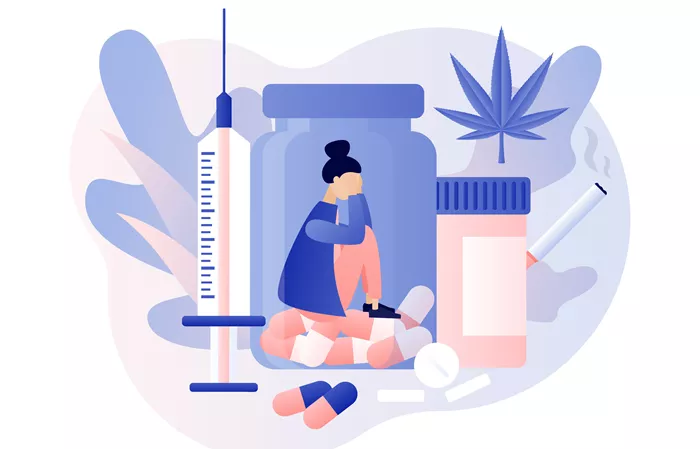Substance abuse is a significant concern in today’s society, impacting millions of individuals and their families. It is often categorized as a psychiatric disorder due to its profound effects on mental health and behavior. This article will explore the relationship between substance abuse and psychiatric disorders, including definitions, symptoms, causes, and treatment options. By understanding this connection, we can better address the challenges faced by those affected.
Substance use disorder (SUD) is characterized by an uncontrollable urge to use substances despite harmful consequences. This disorder can involve legal substances like alcohol and prescription medications, as well as illegal drugs. The Diagnostic and Statistical Manual of Mental Disorders (DSM-5) outlines criteria for diagnosing SUD, emphasizing the importance of recognizing it as a mental health issue rather than merely a behavioral problem.
Is Substance Abuse A Psychiatric Disorder?
Substance use disorders are complex conditions that affect both the brain and behavior. They can lead to significant impairment in daily functioning and overall quality of life. Individuals with SUD may experience various symptoms, including:
Impaired Control: Difficulty controlling the amount or frequency of substance use.
Social Problems: Neglecting responsibilities at work, school, or home due to substance use.
Risky Use: Engaging in dangerous behaviors while under the influence.
Pharmacological Issues: Developing tolerance or experiencing withdrawal symptoms.
These symptoms can vary in severity, with some individuals experiencing mild issues while others face severe challenges that require intensive intervention.
Causes of Substance Use Disorders
The development of substance use disorders can be attributed to a combination of genetic, environmental, and psychological factors. Some key contributors include:
Genetic Predisposition: Family history of addiction can increase an individual’s risk.
Environmental Influences: Exposure to drugs at an early age or living in high-stress environments can trigger substance abuse.
Mental Health Disorders: Co-occurring mental health issues such as anxiety or depression often coexist with SUDs. Individuals may turn to substances as a form of self-medication.
Understanding these causes is crucial for developing effective prevention and treatment strategies.
The Impact of Substance Abuse on Mental Health
Substance abuse has far-reaching effects on mental health. It can exacerbate existing psychiatric disorders or lead to new ones. For example:
Anxiety Disorders: Many individuals with anxiety may use substances to alleviate their symptoms temporarily. However, prolonged use can increase anxiety levels over time.
Depression: Substance abuse is often linked to depressive symptoms. The cycle of using substances to cope with depression can lead to worsening mental health.
Bipolar Disorder: People with bipolar disorder may misuse substances during manic episodes or as a way to manage depressive phases.
The relationship between substance abuse and mental health is reciprocal; each condition can influence the other, making treatment more complex.
Treatment Approaches for Substance Use Disorders
Effective treatment for substance use disorders often requires a comprehensive approach that addresses both the addiction and any co-occurring mental health issues. Common treatment options include:
Detoxification: A medically supervised process to safely manage withdrawal symptoms.
Therapy: Behavioral therapies, such as cognitive-behavioral therapy (CBT), help individuals understand their addiction and develop coping strategies.
Medication: Certain medications can assist in managing cravings and withdrawal symptoms.
Support Groups: Programs like Alcoholics Anonymous (AA) provide community support for individuals in recovery.
An integrated approach that considers both substance abuse and mental health is vital for long-term recovery.
Conclusion
Substance abuse is indeed recognized as a psychiatric disorder due to its significant impact on mental health and behavior. Understanding the complexities of substance use disorders helps us develop more effective prevention and treatment strategies. By addressing both addiction and co-occurring mental health issues, we can support individuals on their journey toward recovery.
FAQs about Bipolar Disorder
What is bipolar disorder?
Bipolar disorder is a mental health condition characterized by extreme mood swings that include emotional highs (mania or hypomania) and lows (depression).
What are the symptoms of bipolar disorder?
Symptoms vary but often include mood changes, energy fluctuations, sleep disturbances, and difficulty concentrating.
How is bipolar disorder treated?
Treatment typically involves medication (mood stabilizers) and psychotherapy (such as cognitive-behavioral therapy).
Can people with bipolar disorder lead normal lives?
Yes, with proper treatment and support, many individuals with bipolar disorder manage their symptoms effectively and lead fulfilling lives.
Related articles:
- What is Bipolar Disorder: Recognizing the Signs
- What Famous People Have Bipolar Disorder?
- 12 Warning Signs Of Bipolar Disorder


